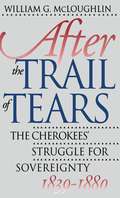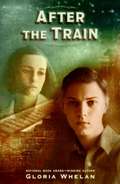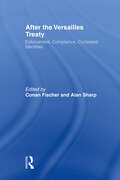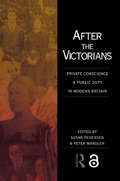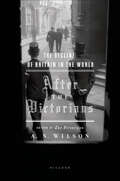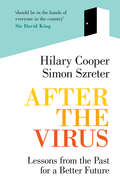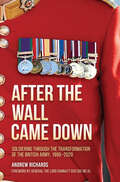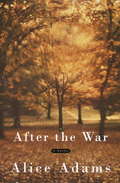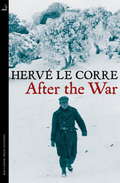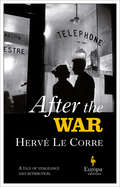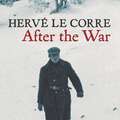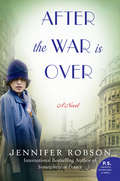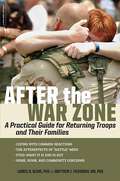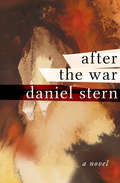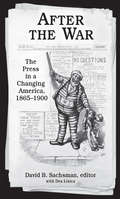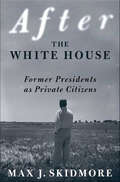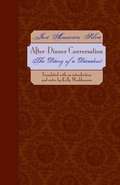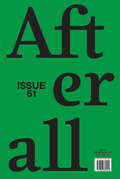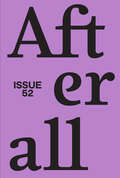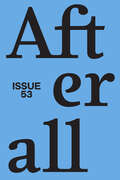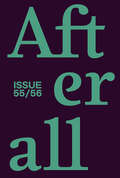- Table View
- List View
After the Trail of Tears
by William G. McloughlinThis powerful narrative traces the social, cultural, and political history of the Cherokee Nation during the forty-year period after its members were forcibly removed from the southern Appalachians and resettled in what is now Oklahoma. In this master work, completed just before his death, William McLoughlin not only explains how the Cherokees rebuilt their lives and society, but also recounts their fight to govern themselves as a separate nation within the borders of the United States. Long regarded by whites as one of the 'civilized' tribes, the Cherokees had their own constitution (modeled after that of the United States), elected officials, and legal system. Once re-settled, they attempted to reestablish these institutions and continued their long struggle for self-government under their own laws--an idea that met with bitter opposition from frontier politicians, settlers, ranchers, and business leaders. After an extremely divisive fight within their own nation during the Civil War, Cherokees faced internal political conflicts as well as the destructive impact of an influx of new settlers and the expansion of the railroad. McLoughlin brings the story up to 1880, when the nation's fight for the right to govern itself ended in defeat at the hands of Congress.
After the Train
by Gloria WhelanPeter Liebig can't wait for summer. He's tired of classrooms, teachers, and the endless lectures about the horrible Nazis. The war has been over for ten years, and besides, his town of Rolfen, West Germany, has moved on nicely. Despite its bombed-out church, it looks just as calm and pretty as ever. There is money to be made at the beach, and there are whole days to spend with Father at his job. And, of course, there's soccer. Plenty for a thirteen-year-old boy to look forward to. But when Peter stumbles across a letter he was never meant to see, he unravels a troubling secret. Soon he questions everything-the town's peaceful nature, his parents' stories about the war, and his own sense of belonging.
After the Versailles Treaty: Enforcement, Compliance, Contested Identities
by Conan Fischer Alan SharpDesigned to secure a lasting peace between the Allies and Germany, the Versailles Settlement soon came apart at the seams. In After The Versailles Treaty an international team of historians examines the almost insuperable challenges facing victors and vanquished alike after the ravages of WW1. This is not another diplomatic history, instead focusing on the practicalities of treaty enforcement and compliance as western Germany came under Allied occupation and as the reparations bill was presented to the defeated and bankrupt Germans. It covers issues such as: How did the Allied occupiers conduct themselves and how did the Germans respond? Were reparations really affordable and how did the reparations regime affect ordinary Germans? What lessons did post-WW2 policymakers learn from this earlier reparations settlement The fraught debates over disarmament as German big business struggled to adjust to the sudden disappearance of arms contracts and efforts were made on the international stage to achieve a measure of global disarmament. The price exacted by the redrawing of frontiers on Germany’s eastern and western margins, as well as the (gentler) impact of the peace settlement on identity in French Flanders. This book was previously published as a special issue of Diplomacy and Statecraft
After the Victorians: Private Conscience and Public Duty in Modern Britain
by Susan Pedersen Peter MandlerWritten by a team of eminent historians, these essays explore how ten twentieth-century intellectuals and social reformers sought to adapt such familiar Victorian values as `civilisation', `domesticity', `conscience' and `improvement' to modern conditions of democracy, feminism and mass culture. Covering such figures as J.M. Keynes, E.M. Forster and Lord Reith of the BBC, these interdisciplinary studies scrutinize the children of the Victorians at a time when their private assumptions and public positions were under increasing strain in a rapidly changing world. After the Victorians is written in honour of the late Professor John Clive of Harvard, and uses, as he did, the method of biography to connnect the public and private lives of the generations who came after the Victorians.
After the Victorians: The Decline of Britain in the World
by A. N. WilsonThe distinguished historian A.N. Wilson has charted, in vivid detail, Britain's rise to world dominance, a tale of how one small island nation came to be the mightiest, richest country on earth, reigning over much of the globe. Now in his much anticipated sequel to the classic The Victorians, he describes how in little more than a generation Britain's power and influence in the world would virtually dissolve. In After the Victorians, Wilson presents a panoramic view of an era, stretching from the death of Queen Victoria in 1901 to the dawn of the cold war in the early 1950s. He offers riveting accounts of the savagery of World War I and the world-altering upheaval of the Communist Revolution. He explains Britain's role in shaping the destiny of the Middle East. And he casts a bright new light on the World War II years: Britain played a central role in defeating Germany but at a severe cost. The nation would emerge from the war bankrupt and fatally weakened, sidelined from world politics, while America would assume the mantle of dominant world power, facing off against the Soviet Union in the cold war. Wilson's perspective is not confined to the trenches of the battlefield and the halls of parliament: he also examines the parallel story of the beginnings of Modernism-he visits the novelists, philosophers, poets, and painters to see what they reveal about the activities of the politicians, scientists, and generals.Blending military, political, social, and cultural history of the most dramatic kind, A.N. Wilson offers an absorbing portrait of the decline of one of the world's great powers. The result is a fresh account of the birth pangs of the modern world, as well as a timely analysis of imperialism and its discontents.
After the Virus: Lessons from the Past for a Better Future
by Simon Szreter Hilary CooperWhy was the UK so unprepared for the pandemic, suffering one of the highest death rates and worst economic contractions of the major world economies in 2020? Hilary Cooper and Simon Szreter reveal the deep roots of our vulnerability and set out a powerful manifesto for change post-Covid-19. They argue that our commitment to a flawed neoliberal model and the associated disinvestment in our social fabric left the UK dangerously exposed and unable to mount an effective response. This is not at all what made Britain great. The long history of the highly innovative universal welfare system established by Elizabeth I facilitated both the industrial revolution and, when revived after 1945, the postwar Golden Age of rising prosperity. Only by learning from that past can we create the fairer, nurturing and empowering society necessary to tackle the global challenges that lie ahead - climate change, biodiversity collapse and global inequality.
After the Wall Came Down: Soldiering through the Transformation of the British Army, 1990–2020
by Andrew RichardsThe generation of young men and women who joined the British Army during the mid to late 1980s would serve their country during an unprecedented period of history. Unlike the two world war generations, they would never face total war – there was never any declaration of war and there was no one single country to defeat. In fact, it was supposed to have been the end of war, a time of peace and stability. Politicians started to use the term, Peace Dividend, with government officials even planning on how and where it should be spent. But for those in the military, the two decades following the end of the Cold War would not be a time of peace. Government spending and the size of the military was reduced but the Army’s commitments increased exponentially. Those serving not only faced continuous deployment in overseas operations, they would also be involved in immense upheavals that took place within the army. When the Berlin Wall came down, the British Army had not changed for decades. The ending of the Cold War, combined with a technological revolution, a changing society at home, and new global threats mean that the Army of the second decade of the twentieth-first century – the army this generation of soldiers is now retiring from – is unrecognizable from the one they joined in the late 1980s. This is the story of the soldiers who served in the British Army in those tumultuous decades.
After the War
by Alice AdamsIn her final novel, published posthumously, Alice Adams returns to the Southern college town of Pinehill, the setting for her acclaimed Southern Exposure. Even after five years in Pinehill, Cynthia Baird is still considered a Yankee. And life has become more difficult since the beginning of the war. With Harry stationed in London, Cynthia finds life in a small town complicated not only be loneliness but also by a growing awareness of local racism and anti-Semitism. Their daughter Abigail is about to return north for college, and the two generations are forced to determine what they cherish and what they must leave behind. And as Abigail heads off to college, where she faces all the traditional complications of youth, we are drawn into an America caught between past and future, and two generations forced to determine what they cherish and what they must leave behind. Alice Adams's depiction of her native South--full, rich, affectionate, and always one of her many strengths--is at its most subtle and engrossing in After the War.
After the War
by Carol MatasAfter being released from Buchenwald at the end of World War II, fifteen-year-old Ruth risks her life to lead a group of children across Europe to Palestine.
After the War
by Sam Taylor Hervé Le Corre1950's Bordeaux. Even now, the Second World War is never far from people's memories, particularly in a city where the scars of collaboration and resistance are more keenly felt than ever. But another war has already begun. A war without a name, far away across the sea, in Algeria, where young men are sent to fight in a brutal conflict.Daniel knows what awaits him. He's heard stories. Patrols, ambushes, reprisals, massacres, mutilations, all beneath a burning north African sun. He has just a month left before he leaves but, haunted by the loss of his parents and sister in the atrocities of the last war, Daniel questions why he is even going to fight in the first place.Meanwhile, past crimes are returning to haunt Albert Darlac, the godfather of Bordeaux: corrupt police chief, fascist sympathiser and one-time collaborator. Before long, a series of explosive events will set off a spiral of violence that will bring the horrific legacy of wars past and present to the streets of Bordeaux.Translated from the French by Sam Taylor
After the War
by Hervé Le CorreA lost young man and a corrupt politician deal with the legacy World War II has left them in this crime novel, by the author of Talking to Ghosts.1950s Bordeaux is a city plagued by memories and scars of the Second World War. Meanwhile, across the sea, another war has already begun. The young men of France are sent in droves to Algeria, where they wage brutal battle in a conflict so new it has yet to be given a name.Albert Darlac, a corrupt police chief, fascist sympathizer, and one-time collaborator, will soon discover that not everybody has forgiven or forgotten his wartime crimes. Twenty-year-old Daniel has heard the stories of massacres and mutilations, of ambushes and patrols played out under a burning north African sun. The atrocious loss of his parents and sister in the war that has just ended haunts him. A series of explosive events will bring the destinies of these two men together in this uncompromising masterpiece set in a world driven by retribution . . .Praise for After the War“Graphic in its violence but rich in history and psychology, this novel is vivid proof that “after the war, sometimes the war continues.” —Kirkus Reviews“The writing of Hervé Le Corre has a musicality that verges on the poetic. He is the perfect portraitist.” —Le Monde (France)“Composed with all the skill of a virtuoso, mingling the colorful slang of bistros and bad guys with sensitive, sharp, crystalline prose that pierces you to the core. Superb.” —Télérama (France)“Full-blooded and uncompromising. Extraordinary.” —L’Express (France)
After the War (MacLehose Press Editions #6)
by Hervé Le Corre1950's Bordeaux. Even now, the Second World War is never far from people's memories, particularly in a city where the scars of collaboration and resistance are more keenly felt than ever. But another war has already begun. A war without a name, far away across the sea, in Algeria, where young men are sent to fight in a brutal conflict.Daniel knows what awaits him. He's heard stories. Patrols, ambushes, reprisals, massacres, mutilations, all beneath a burning north African sun. He has just a month left before he leaves but, haunted by the loss of his parents and sister in the atrocities of the last war, Daniel questions why he is even going to fight in the first place.Meanwhile, past crimes are returning to haunt Albert Darlac, the godfather of Bordeaux: corrupt police chief, fascist sympathiser and one-time collaborator. Before long, a series of explosive events will set off a spiral of violence that will bring the horrific legacy of wars past and present to the streets of Bordeaux.Translated from the French by Sam Taylor
After the War (MacLehose Press Editions #6)
by Hervé Le Corre1950's Bordeaux. Even now, the Second World War is never far from people's memories, particularly in a city where the scars of collaboration and resistance are more keenly felt than ever. But another war has already begun. A war without a name, far away across the sea, in Algeria, where young men are sent to fight in a brutal conflict.Daniel knows what awaits him. He's heard stories. Patrols, ambushes, reprisals, massacres, mutilations, all beneath a burning north African sun. He has just a month left before he leaves but, haunted by the loss of his parents and sister in the atrocities of the last war, Daniel questions why he is even going to fight in the first place.Meanwhile, past crimes are returning to haunt Albert Darlac, the godfather of Bordeaux: corrupt police chief, fascist sympathiser and one-time collaborator. Before long, a series of explosive events will set off a spiral of violence that will bring the horrific legacy of wars past and present to the streets of Bordeaux.Translated from the French by Sam Taylor(P)2017 WF Howes Ltd
After the War Is Over: A Novel
by Jennifer RobsonThe internationally bestselling author of Somewhere in France returns with her sweeping second novel--a tale of class, love, and freedom--in which a young woman must fnd her place in a world forever changedAfter four years as a military nurse, Charlotte Brown is ready to leave behind the devastation of the Great War. The daughter of a vicar, she has always been determined to dedicate her life to helping others. Moving to busy Liverpool, she throws herself into her work with those most in need, only tearing herself away for the lively dinners she enjoys with the women at her boardinghouse.Just as Charlotte begins to settle into her new circumstances, two messages arrive that will change her life. One is from a radical young newspaper editor who offers her a chance to speak out for those who cannot. The other pulls her back to her past, and to a man she has tried, and failed, to forget.Edward Neville-Ashford, her former employer and the brother of Charlotte's dearest friend, is now the new Earl of Cumberland--and a shadow of the man he once was. Yet under his battle wounds and haunted eyes Charlotte sees glimpses of the charming boy who long ago claimed her foolish heart. She wants to help him, but dare she risk her future for a man who can never be hers?As Britain seethes with unrest and postwar euphoria fattens into bitter disappointment, Charlotte must confront long-held insecurities to fnd her true voice . . . and the courage to decide if the life she has created is the one she truly wants.
After the War Zone: A Practical Guide for Returning Troops and Their Families
by Matthew J. Friedman Laurie B. SloneTwo experts from the VA National Center for PTSD provide an essential resource for service members, their spouses, families, and communities, sharing what troops really experience during deployment and back home. Pinpointing the most common after-effects of war and offering strategies for troop reintegration to daily life, Drs. Friedman and Slone cover the myths and realities of homecoming; reconnecting with spouse and family; anger and adrenaline; guilt and moral dilemmas; and PTSD and other mental-health concerns. With a wealth of community and government resources, tips, and suggestions, <i>After the War Zone</i> is a practical guide to helping troops and their families prevent war zone stresses from having a lasting negative impact.
After the War: A Novel
by Daniel SternAfter a tour of combat abroad, a young man determined to keep to himself is drawn into the dramas of his East Village neighborsWorld War II veteran Richard Stone is attempting to transition back into normal life. An aspiring writer, he&’s surviving off the GI Bill and the help of friends. Living free of attachments and responsibilities, he thinks, is the best way to defend himself from the world&’s pain, like his unhappy upbringing or his best friend&’s death in the war.But his neighborhood on Second Avenue won&’t permit such seclusion. The characters around Richard include a lonely poet, an unhappy literary couple, and a widower who can&’t stop thinking about the plight of Europe&’s Jews. Gradually they pull Richard into their lives, and even introduce him to the lovely Jemmy Gordon—but life and happiness are not so simple.
After the War: A Novel (Modern Masters Ser.)
by Daniel SternAfter a tour of combat abroad, a young man determined to keep to himself is drawn into the dramas of his East Village neighborsWorld War II veteran Richard Stone is attempting to transition back into normal life. An aspiring writer, he&’s surviving off the GI Bill and the help of friends. Living free of attachments and responsibilities, he thinks, is the best way to defend himself from the world&’s pain, like his unhappy upbringing or his best friend&’s death in the war.But his neighborhood on Second Avenue won&’t permit such seclusion. The characters around Richard include a lonely poet, an unhappy literary couple, and a widower who can&’t stop thinking about the plight of Europe&’s Jews. Gradually they pull Richard into their lives, and even introduce him to the lovely Jemmy Gordon—but life and happiness are not so simple.
After the War: The Press in a Changing America, 1865–1900
by David B. SachsmanAfter the War presents a panoramic view of social, political, and economic change in post-Civil War America by examining its journalism, from coverage of politics and Reconstruction to sensational reporting and images of the American people. The changes in America during this time were so dramatic that they transformed the social structure of the country and the nature of journalism. By the 1870s and 1880s, new kinds of daily newspapers had developed. New Journalism eventually gave rise to Yellow Journalism, resulting in big-city newspapers that were increasingly sensationalistic, entertaining, and designed to attract everyone. The images of the nation’s people as seen through journalistic eyes, from coverage of immigrants to stories about African American "Black fiends" and Native American "savages," tell a vibrant story that will engage scholars and students of history, journalism, and media studies.
After the White House: Former Presidents as Private Citizens
by Max J. SkidmoreWhat exactly has Bill Clinton been doing since he left office? What can he expect to accomplish? What have his predecessors in his position done? Many presidents have had enormous impacts on the course of history after their terms ended, but not until After the White House by Max J. Skidmore has their role been examined. Thirty-two completed their terms. Four became presidential candidates again (one was even elected), two served in Congress, one abandoned his country to accept election to the Confederate Congress, one became Chief Justice, and one has the unique distinction of having his First Lady become a United States senator. Former presidents almost always remain influential, but their post-term activities have received little attention or scrutiny until now.
After-Dinner Conversation: The Diary of a Decadent
by José Asunción SilvaLost in a shipwreck in 1895, rewritten before the author's suicide in 1896, and not published until 1925, José Asunción Silva's After-Dinner Conversation (De sobremesa) is one of Latin America's finest fin de siècle novels and the first one to be translated into English. Perhaps the single best work for understanding turn-of-the-twentieth-century writing in South America, After-Dinner Conversation is also cited as the continent's first psychological novel and an outstanding example of modernista fiction and the Decadent sensibility. Semi-autobiographical and more important for style than plot, After-Dinner Conversation is the diary of a Decadent sensation-collector in exile in Paris who undertakes a quest to find his beloved Helen, a vision whom his fevered imagination sees as his salvation. Along the way, he struggles with irreconcilable urges and temptations that pull him in every direction while he endures an environment indifferent or hostile to spiritual and intellectual pursuits, as did the modernista writers themselves. Kelly Washbourne's excellent translation preserves Silva's lush prose and experimental style. In the introduction, one of the most wide-ranging in Silva criticism, Washbourne places the life and work of Silva in their literary and historical contexts, including an extended discussion of how After-Dinner Conversation fits within Spanish American modernismo and the Decadent movement. Washbourne's perceptive comments and notes also make the novel accessible to general readers, who will find the work surprisingly fresh more than a century after its composition.
Afterall: A Journal of Art, Context and Enquiry, volume 51 number 1 (Spring 2021)
by Afterall: A Journal of Art, Context and EnquiryThis is volume 51 issue 1 of Afterall: A Journal of Art, Context and Enquiry. Afterall is a journal of contemporary art that provides in-depth analysis of art and its social, political, and philosophical contexts. Each issue provides the reader with well-researched contributions that discuss each artist's work from different perspectives. Contextual essays and other texts discussing events, works, or exhibitions further develop the thematic focus of each issue.
Afterall: A Journal of Art, Context and Enquiry, volume 52 number 1 (Autumn/Winter 2021)
by Afterall: A Journal of Art, Context and EnquiryThis is volume 52 issue 1 of Afterall: A Journal of Art, Context and Enquiry. Afterall is a journal of contemporary art that provides in-depth analysis of art and its social, political, and philosophical contexts. Each issue provides the reader with well-researched contributions that discuss each artist's work from different perspectives. Contextual essays and other texts discussing events, works, or exhibitions further develop the thematic focus of each issue.
Afterall: A Journal of Art, Context and Enquiry, volume 53 number 1 (Spring 2022)
by Afterall: A Journal of Art, Context and EnquiryThis is volume 53 issue 1 of Afterall: A Journal of Art, Context and Enquiry. Afterall is a journal of contemporary art that provides in-depth analysis of art and its social, political, and philosophical contexts. Each issue provides the reader with well-researched contributions that discuss each artist's work from different perspectives. Contextual essays and other texts discussing events, works, or exhibitions further develop the thematic focus of each issue.
Afterall: A Journal of Art, Context and Enquiry, volume 54 number 1 (Autumn/Winter 2022)
by Afterall: A Journal of Art, Context and EnquiryThis is volume 54 issue 1 of Afterall: A Journal of Art, Context and Enquiry. Afterall is a journal of contemporary art that provides in-depth analysis of art and its social, political, and philosophical contexts. Each issue provides the reader with well-researched contributions that discuss each artist's work from different perspectives. Contextual essays and other texts discussing events, works, or exhibitions further develop the thematic focus of each issue.
Afterall: A Journal of Art, Context and Enquiry, volume 55-56 number 1 (Spring 2023)
by Afterall: A Journal of Art, Context and EnquiryThis is volume 55-56 issue 1 of Afterall: A Journal of Art, Context and Enquiry. Afterall is a journal of contemporary art that provides in-depth analysis of art and its social, political, and philosophical contexts. Each issue provides the reader with well-researched contributions that discuss each artist's work from different perspectives. Contextual essays and other texts discussing events, works, or exhibitions further develop the thematic focus of each issue.
